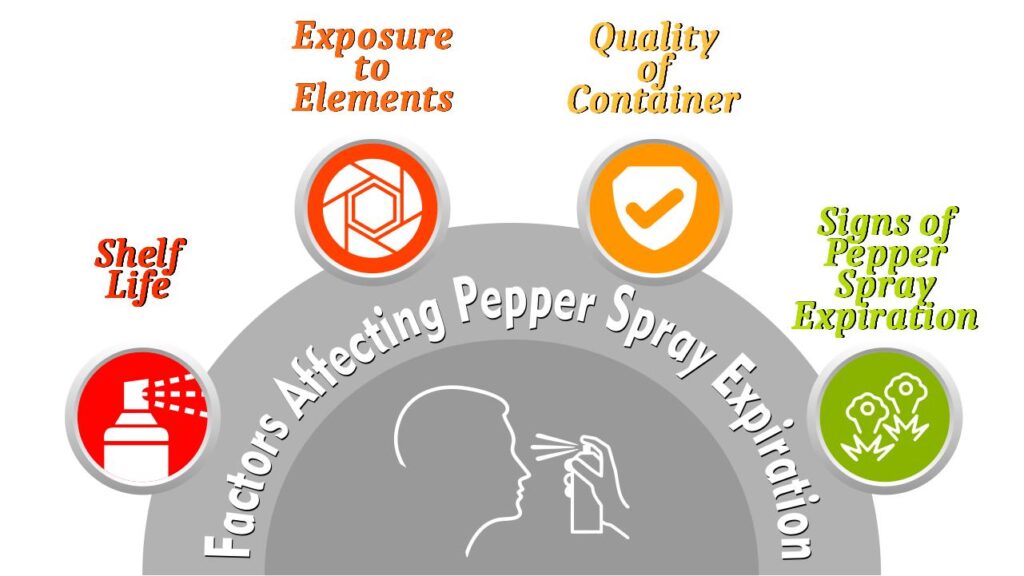Table of Contents
- Understanding the Chemical Degradation in Expired Pepper Spray
- Potential Malfunctions and Reduced Effectiveness Over Time
- Health Risks Associated with Using Expired Pepper Spray
- Best Practices for Safe Storage and Timely Replacement
- Insights and Conclusions
Understanding the Chemical Degradation in Expired Pepper Spray
Over time, the chemical components in pepper spray undergo subtle but significant changes that can drastically reduce their effectiveness. The active ingredient, capsaicin, breaks down due to exposure to heat, light, and oxygen, leading to diminished potency. Additionally, the propellant gas responsible for delivering the spray can leak or degrade, causing inconsistent discharge or even complete failure. These chemical shifts don’t just make the spray less reliable-they may also alter how the substance interacts with the eyes and skin, sometimes increasing the risk of irritation or complications.
Several factors contribute to the degradation process, including:
- Exposure to environmental elements: UV light and fluctuating temperatures accelerate breakdown.
- Container integrity: Rust or corrosion can affect valve function and spray pressure.
- Time: Even unopened cans reach a point where the chemical balance becomes unstable.
Understanding these dynamics is crucial for anyone relying on pepper spray for safety, as expired products can lead to false security or unintended risks. Regularly checking expiration dates and replacing units proactively ensures the intended protective power remains strong and dependable.
Potential Malfunctions and Reduced Effectiveness Over Time
Over time, the chemical components inside pepper spray can degrade, leading to a noticeable decline in the product’s potency. This deterioration can result in weaker sprays that fail to produce the intended incapacitating effect, potentially leaving you vulnerable in high-risk situations. The aerosol propellant may also lose pressure, causing uneven dispersion or an insufficient spray pattern, which undermines the deterrent’s effectiveness. Such issues are rarely visible on the outside, making it crucial to stay vigilant about expiry dates and product condition.
Key concerns include:
- Clogging or leakage: Old pepper spray canisters may develop blockages or small leaks, reducing the spray volume or causing unexpected discharge.
- Reduced active ingredient concentration: Capsaicin levels might drop below effective thresholds, diminishing the spray’s ability to cause irritation and deterrence.
- Inconsistent spray patterns: Aging aerosols may shift from a focused stream to a weak mist, decreasing accuracy and making it harder to target an assailant decisively.
Health Risks Associated with Using Expired Pepper Spray
When pepper spray surpasses its expiration date, its chemical composition can begin to degrade, drastically reducing its effectiveness. This degradation means that the active ingredients may no longer deliver the immediate incapacitating effect necessary for self-defense, leaving users vulnerable in critical situations. Additionally, expired pepper spray can produce unpredictable spray patterns or clog the nozzle, which can lead to accidental discharge or failure to deploy when needed most.
Beyond diminished performance, there are additional health risks to consider. Using expired pepper spray could cause:
- Increased eye irritation: Broken-down chemicals may irritate the eyes more severely or for longer durations than fresh spray.
- Respiratory complications: Inhalation of degraded agents might provoke stronger respiratory distress or allergic reactions.
- Skin reactions: Prolonged contact with degraded substances can lead to unexpected burns or dermatitis.
These hazards highlight the importance of regularly checking expiration dates and replacing pepper spray as recommended to ensure safety and reliability during emergencies.
Best Practices for Safe Storage and Timely Replacement
To maximize the effectiveness of your pepper spray, proper storage is crucial. Always keep your canister in a cool, dry place away from direct sunlight and extreme temperatures, as heat can degrade the chemical composition, making it less potent. Avoid storing it in your car glove compartment or trunk, where fluctuating temperatures are common. Regularly inspect the canister for any signs of damage, rust, or leakage, which could indicate compromised integrity. Also, ensure it remains easily accessible so you can grab it instantly in an emergency without fumbling through bags or drawers.
Timely replacement of your pepper spray is equally important to guarantee safety and reliability. Most products have a shelf life of about 2 to 4 years, clearly marked on the label or canister. Create a routine to check expiration dates and replace expired units immediately to avoid the false sense of security that can come from using ineffective sprays. Consider setting calendar reminders or using apps to manage replacement schedules. Remember, investing in a new canister is a small price to pay for your personal safety and confidence.
- Store pepper spray at room temperature, between 35°F and 120°F (1.5°C to 49°C)
- Keep out of reach of children and pets
- Test the spray periodically in a safe area to ensure functionality
- Replace immediately after use or if expiration date has passed
Insights and Conclusions
In conclusion, while expired pepper spray might seem like a convenient option in moments of urgency, relying on it can pose significant risks to your safety. The diminished potency and potential chemical instability of outdated sprays mean you could be left defenseless when it matters most. Regularly checking expiration dates and replacing your pepper spray with fresh, reliable products is a simple yet crucial step to ensure your personal security. Stay informed, stay prepared, and never underestimate the importance of using effective self-defense tools that you can truly count on.Check Our Other Blogs
- StunGun – Your Trusted Source for Stun Guns, Laws, and Self-Defense Tips
- PepperSprayLaws – Your Trusted Resource for Pepper Spray Information
- StunGunLaws – Your Trusted Guide to Stun Gun Legality and Safety




